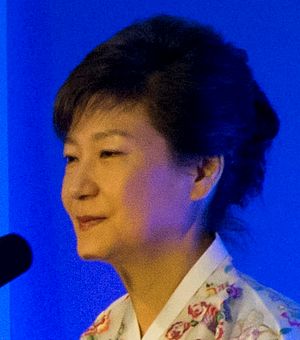The new global competitiveness ranking by the World Economic Forum (WEF) revealed that all is not well in South Korea’s export-dependent economy. Having already been pushed down to 23rd place in 2013, the new figures show that the country now stands in 26th place, just ahead of China (28th) and far behind other Asian Tiger economies (Singapore – 2nd, Hong Kong – 7th, Taiwan – 14th). This is a major wakeup call for the country that had long prided itself on its economic achievements and a signal that major structural changes are needed to revitalize growth.
The relative decline of the economy’s competitiveness has sparked concerns in South Korea that the country will not be able to overtake Japan’s per capita income, an important measurement of the country’s growth and well being. This stands in stark contrast to other Tiger economies such as Taiwan, which saw its per capita income rise above that of Japan in 2010.
One key problem is that South Korea’s export markets are shrinking. Exemplary of this trend is the country’s relationship with its largest trade partner, China. After enjoying 31 straight months of surpluses, South Korea is now a net importer of goods from China. In part, this decline comes from Beijing’s efforts to “rebalance” its economy, curbing its massive consumption of inputs. But this is only one part of the problem. South Korean enterprises face significant challenges from China’s domestic manufacturers, whose increased competitiveness in petrochemical products and IT have reduced market shares for Korean exporters.
To some degree, there will be short to medium term dividends from ratifying the planned free trade agreement with China; however, efficiency gains from lower barriers to trade will not last forever.
Something that may greatly improve long-term prospects for export enterprises is the prudent deregulation of the market. Analysts point to the rapid rise of business regulations during the previous Lee Myung-bak administration as a key burden on producers seeking to expand business operations. While the Park administration has promised to spur productivity by eliminating unnecessary regulations, the task has proved to be more difficult than expected. At the same time, these challenges are further complicated by the government’s push to eliminate public and private sector collusion following the Sewol ferry disaster.
Going back to the WEF’s global competitiveness ranking, it is clear that South Korea’s weakening competitiveness is not due to Seoul’s legal framework alone. The study incorporated factors like health and primary education, labor market efficiency, and other key areas into its rankings. In order for Seoul to ensure the country’s long-term growth as an innovation-driven economy, more investments must be made to more efficiently cultivate human capital, close the disparity between the genders, and other areas that were not well tended to during the country’s rapid economic growth period.
South Korea still maintains great growth potential, but Seoul should remember that strategies that had been successful in the past may not be appropriate for the new era of globalization.

































